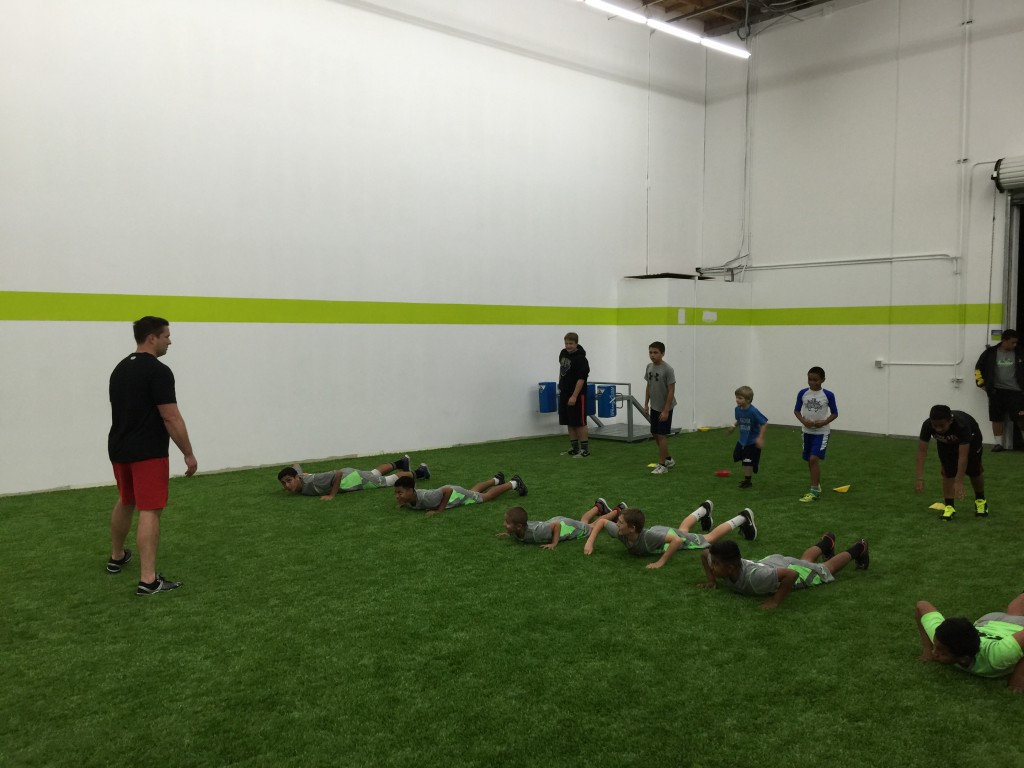Overview
Age
- Under 8 as of Sept 1st
- Non-contact
Equipment
- Ball Size: 3
- Cleats
- Mouth guard compulsory
Glasses may not be worn during training or in matches.
Pitch Sizes

- The maximum pitch size is 60 meters x 30 meters, plus 5 meters for each in-goal area.
Teams
- Touch Rugby is played between teams of equal numbers of players, each team containing not more than seven players and no less than five players.
- Each side can have an agreed number of substitutes. Substituted players can be re-used at any time. Substitutions can only take place when the ball is ‘dead’ or at half time and always with the referee’s knowledge.
Objective
- The object of the game is to score a try (5 points) by placing the ball with a downward pressure on or behind the opponents’ goal-line.
- When a try is scored, the game is restarted by the non-scoring team, by a kick-off from the centre of the pitch.
Rules of game
Passing
- The ball can only be passed sideways or backwards through the air, not handed to another player.
- If the ball is handed to another player, or passed or knocked forward (towards the opponents’ goal-line), then a penalty is awarded to the non-offending side, unless advantage occurs to the non-offending side.
- In order to keep the game flowing, referees should play advantage wherever possible.
- The offending side needs to go back 5 yards before advancing forward again.
Kicking
- There is no kicking of any kind in U8 Non-Contact Rugby.
Tap-a-Go (Free Kick)
- Tap of the ball on your foot is used to restart play after an infringement from where the referee makes a mark when an infringement has taken place.
- At a “Tap-and-Go”, the opposition must be 7 meters back from the mark. They cannot start moving forward until the ball is tapped on the foot. The player must start with the ball in both hands and, when instructed by the referee who will call “PLAY”, pass the ball backwards through the air to a member of their team.
- If an infringement takes place or the ball goes into touch over the goal-line or within 7 meters of the goal.
Rules of Conduct & Expectations
Expectations of coaches & parents
- Recognize the importance of fun and enjoyment when coaching players.
- Understand that most learning is achieved through doing.
- Appreciate the needs of the players before the needs of the sport.
- Be a positive role model
- Keep winning and losing in perspective – encourage players to behave with dignity in all circumstances.
- Respect all referees and the decisions they make, even if they appear to make a mistake, (remember it could be you refereeing next week) and ensure that the players recognize that they must do the same. (g) Provide positive verbal feedback in a constructive and encouraging manner to all players, both during coaching sessions and matches.
- Provide rugby experiences which are matched to the players’ ages and abilities, as well as their physical and behavioral development.
- Ensure all players are coached in a safe environment, with adequate first aid readily to hand.
- Avoid the overplaying of the best players by using a squad system which gives everybody a satisfactory amount of playing time.
- Never allow a player to train or play when injured.
- Ensure good supervision of players, both on and off the field.
- Recognize that players should never be exposed to extremes of heat, cold or unacceptable risk of injury.
- Develop an awareness of nutrition as part of an overall education in lifestyle management.
- Recognize that it is illegal for players under 18 to drink alcohol or for those under 16 to smoke. Coaches should actively discourage both.
- Ensure that their knowledge and coaching strategies are up to date and in line with RFU philosophy.
- Be aware of, and abide by, the RFU recommended procedures for taking young people on residential tours at home and abroad.
- Be aware of and abide by the policies and procedures outlined in the Policy and Procedures for the Welfare of Young People in Rugby Union.
- Coach to the rules laid down in the Rugby Continuum and keep them updated on rule changes.
The Good Player's code
- Recognize and appreciate the efforts made by coaches, parents, match officials and administrators in providing the opportunity to play the game and enjoy the rugby environment.
- Understand the values of loyalty and commitment to adults and team mates.
- Recognize that every player has a right to expect their involvement in rugby to be safe and free from all types of abuse.
- Understand that if an individual or group of players feels they are not being treated in a manner that is acceptable, then they should tell an adult either at the Club or School or outside of the game.
- Play because they want to do so, not to please coaches or parents.
- Remember that skill development, fun and enjoyment are the most important parts of the game.
- Be attentive at all training and coaching sessions.
- Work equally hard for themselves and their team – both will then benefit.
- Recognize good play by all players on their team and by their opponents.
- Be a sportsman – win with dignity, lose with grace.
- Play to the Laws of the Game and accept, without question, all referees’ decisions even if they appear to make a mistake.
- Control their emotions. Verbal or physical abuse of team mates, opponents, coaches, match officials or spectators is not acceptable.
- Treat all players, as they would like to be treated themselves. Do not interfere with, bully or take advantage of any player.
Dangerous Play
- Dangerous play can cause injury. Coaches and match officials must be particularly vigilant to prevent it.
- There will always be knocks and bumps in rugby, but if dangerous play is eliminated, then many seri-ous injuries will never happen.
- After a stoppage for injury, restart play with a “tap and go” to the team that had possession of the ball immediately prior to the stoppage.
Discipline
- If the referee decides that a player must cease to participate in a match, they must stop the match, call the individual player aside from the other players and invite the coach of that player on to the field. The referee must explain to the coach and the player why they feel the player’s behavior is unacceptable and instruct the coach to provide a substitute player. That player is to take no further part in that Festival or Fixture. It is the responsibility of the coach to speak to and educate the player as to why such action was taken.
- Clubs and Schools complying with Section 2 of the Rugby Continuum will have both a Child Protection Policy and a player disciplinary procedure. While player indiscipline (including physical and verbal abuse and actions contravening the Rugby Continuum) will in most cases be dealt with in accordance with the player disciplinary procedure it should be recognized that there will be some instances where the relevant actions also fall within the scope of the Child Protection Policy.
- In the case of actions on the part of adults involved Touch Rugby which contravene the Codes of Practice (for parents, spectators, match officials or coaches) contained in the Rugby Continuum, the recommended procedure is as follows:
- The match or training session should be stopped and the match officials and coaches should confer and agree on a course of action appropriate to the circumstances. This may include the match officials and relevant coach warning the adult concerned or requesting the relevant adult to vacate the vicinity of the pitch before recommencing the match or training. In extreme cases or where the adult refuses to cooperate, the match or training should be abandoned.
- The match officials and coaches should notify the incident to the Chairmen of the Mini-Midi Sections of their respective Clubs or to the Head of Games in the case of Schools for further consideration. In extreme cases this may include banning the relevant adult from attending matches and/or training sessions for a period and/or submission of a complaint to the relevant Constituent Body. (3) Where the relevant actions fall within the Child Protection Policy, Clubs and Schools should also institute the procedures contained in such policy. (d) In all cases where a disciplinary matter has been referred to a Constituent Body, the Constituent Body may require either Club or Schools to provide additional information on the incident including confirmation of the action taken and May in exceptional cases refer the matter to the RFU for further consideration and sanctions. 3.29
Safety
- Wearing of mouth guard is compulsory in case of accidental collision. Ideally mouth guards should be custom made from a dental impression of the teeth.
- If a player appears injured, the referee must blow the whistle and stop play immediately. Obviously the referee must use judgment – players don’t want to stop for every slight knock – but it is usually possible to tell when a player is hurt. Where possible, invite the player to get up. If it hurts them to move, let them stay where they are (if this will not worsen their injury) and send for expert help. In all cases it is essential that other people/players are stopped from rushing in and hauling the player to their feet. They may mean well, but they could make the damage even worse. In summary, take no chances: act fast but act with caution.
- If referees find themselves in an injury situation, they must concentrate on the vital things. If there is difficulty breathing remove the player’s mouth guard and ensure the player hasn’t swallowed their tongue: if they have, hook it out at once. If they seem stunned, they may be concussed: if so, they must leave the field and have a medical examination. If there is any bleeding, the player must leave the field for treatment.
What to expect from referee
- Recognize the importance of fun and enjoyment when officiating players.
- Provide positive verbal feedback in a constructive and encouraging manner during games.
- Emphasize the spirit of the game.
- Appreciate the needs of the players before the needs of the sport.
- Understand the physical and behavioral development of players.
- Be a positive role model. Set an example, and as such, comments should be positive and supportive.
- Look to self-improvement e.g. participation in training courses.
- Recognize that the safety of players is paramount.
- Explain decisions – all players are still learning and parents will understand the game better.
- Always penalize foul play.
- Play advantage whenever possible in order to let the game flow.
- Show empathy for the age and ability of players.
- Be consistent and objective.
